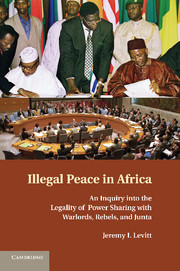Crossref Citations
This Book has been
cited by the following publications. This list is generated based on data provided by Crossref.
Aning, Kwesi
and
Atuobi, Samuel
2011.
The Neglected Economic Dimensions of ECOWAS's Negotiated Peace Accords in West Africa.
Africa Spectrum,
Vol. 46,
Issue. 3,
p.
27.
Gathii, James Thuo
2013.
Introductory Remarks by James Thuo Gathii.
Proceedings of the ASIL Annual Meeting,
Vol. 107,
Issue. ,
p.
187.
Kastner, Philipp
2013.
Illegal Peace in Africa: An Inquiry into the Legality of Power Sharing with Warlords, Rebels, and Junta. By Jeremy I. Levitt. Cambridge: Cambridge University Press, 2012. 301 pages..
Canadian Yearbook of international Law/Annuaire canadien de droit international,
Vol. 50,
Issue. ,
p.
633.
Hultin, Niklas
2014.
The Handbook of Civil Society in Africa.
Vol. 20,
Issue. ,
p.
199.
2015.
Regulating Business for Peace.
p.
185.
EISENSTADT, TODD A.
LeVAN, A. CARL
and
MABOUDI, TOFIGH
2015.
When Talk Trumps Text: The Democratizing Effects of Deliberation during Constitution-Making, 1974–2011.
American Political Science Review,
Vol. 109,
Issue. 3,
p.
592.
Spain, Anna
2015.
Black Women and International Law.
p.
120.
Hyden, Goran
2015.
Rethinking justice and institutions in African peacebuilding.
Third World Quarterly,
Vol. 36,
Issue. 5,
p.
1007.
2015.
Legal Normativity in the Resolution of Internal Armed Conflict.
p.
1.
Levitt, Jeremy I.
2015.
Black Women and International Law.
p.
88.
Reiter, Andrew G.
2016.
Fighting Over Peace.
p.
105.
Wählisch, Martin
2016.
Normative Limits of Peace Negotiations: Questions, Guidance and Prospects.
Global Policy,
Vol. 7,
Issue. 2,
p.
261.
Tom, Patrick
2017.
Liberal Peace and Post-Conflict Peacebuilding in Africa.
p.
105.
Schultze-Kraft, Markus
2018.
Making peace in seas of crime: crimilegal order and armed conflict termination in Colombia.
Crime, Law and Social Change,
Vol. 69,
Issue. 4,
p.
475.
Schultze-Kraft, Markus
2019.
Crimilegal Orders, Governance and Armed Conflict.
p.
139.
Jalloh, Charles C.
2020.
The Legal Legacy of the Special Court for Sierra Leone.
Gottschalk, K.
2021.
Africa and the Formation of the New System of International Relations.
p.
183.
Kastner, Philipp
2022.
International Law and Time.
Vol. 101,
Issue. ,
p.
405.
Inaka, Saint José
2023.
The Post-War Power Sharing and the Legal Politicisation of the Congolese Public Administration.
South African Review of Sociology,
Vol. 53,
Issue. 2,
p.
150.
Inaka, Saint José
Nshimbi, Christopher Changwe
and
Tshimpaka, Leon Mwamba
2023.
The Reconstruction of Post-War Labour Markets in The Southern African Development Community.
p.
3.



